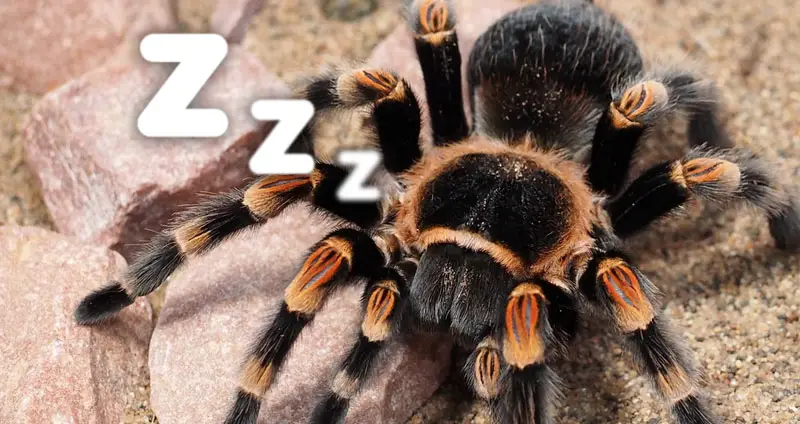Whether you own a spider or just have a curious mind, you may have found yourself wondering whether or not spiders sleep. A lot of living creatures sleep, and with 8 eyes, it makes sense that a spider would need to rest them from time to time. However, do spiders actually sleep? Is it possible that you could find one in the midst of a deep slumber?
There have not been a lot of studies done to answer this question, but we can answer it with scientific knowledge that we already have. So, first thing’s first — spiders don’t sleep in the way that we do. These creatures don’t have eyelids to close, and they don’t simply choose a comfy place to lay down for 8 hours every single night. They do sleep in their own unique way, though!
Science Behind Animal Sleep
It should be noted that all animals have a sort of circadian rhythm — a pattern of activity determined by the time of day. Different animals can either be diurnal, which is active during the day, or nocturnal/crepuscular, which is active during the night. When a creature is inactive, they hide away within a shelter or burrow and experience a drop in their metabolic rate.
Spiders have also been observed going through “overwinter”, which is their version of hibernation. During overwinter, spiders drop their metabolic rate, curl their legs into their body, and stay huddled within a shelter for the coldest months of the year. The fact that spiders have this ability means that it’s possible that they could do this in shorter bursts on a daily basis — thus giving the impression of sleep.
This just makes sense! If a spider is going through a period of time with low food availability and harsh conditions, they’ll go into “sleep mode” in order to conserve energy, much like a computer.
A wide variety of animals have been observed doing this, and they even have side-effects if they go without sleep for a period of time. Animals as small as fruit flies have been observed “sleeping” and face negative effects on their health when the sleep is disturbed or their “awake” period is prolonged. Cockroaches are observed lowering their antennae and decreasing their receptiveness to external stimuli. Crayfish also decrease their sensitivity to stimuli, in addition to having an altered EEG pattern (differing brain function).
Since this behavior has been observed in creatures that are much more simple than spiders, it’s a safe assumption that the same thing is occuring in these 8-legged creatures.
How Do Spiders Sleep?
A variety of different spider owners have observed their pets experiencing their own variation of sleep. Spiders are frequently seen exhibiting behavior that is consistent with sleep, such as loss of muscle tension, prolonged periods of stillness, and lack of response to stimulation. They basically shut down for periods of time, just not in the same way that we humans do!
One interesting characteristic in regards to stimulation is how spiders respond to it when they come out of their sleep stage. Have you ever been sleeping, heard a loud noise, and then jumped up out of bed, wide awake? Spiders will commonly give this “jump” response to stimuli when they’re awoken from their sleep.
Some owners of particularly aggressive spiders, such as the Orange Baboon Tarantula, will see their spider panic and run around their enclosure when startled out of a sleep. It’s as if the spider is trying to fight off any potential threat until it gets a solid grasp on what woke it up in the first place.
So in conclusion, yes, spiders sleep; but not in the way that humans do. They enter a state of dormancy to help preserve their energy, but can quickly and quite literally jump back into action when they need to. Don’t feel bad about waking a sleeping spider though — they almost certainly don’t dream, so you won’t be interrupting anything important.

